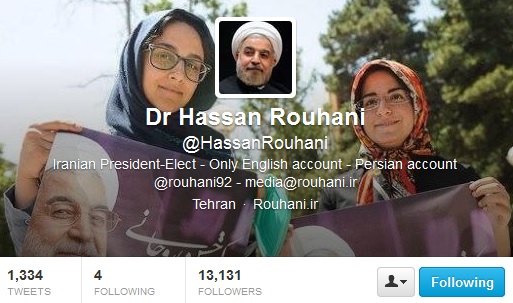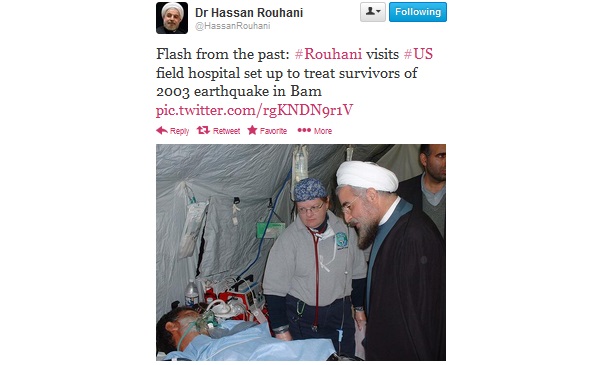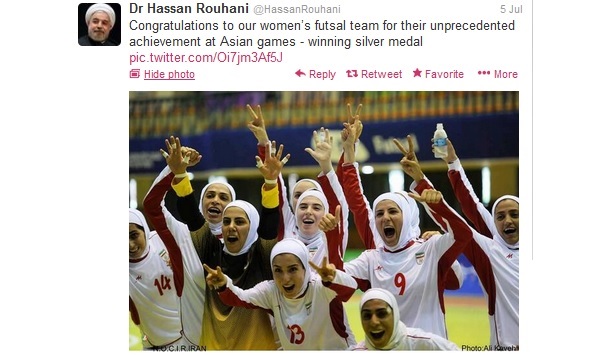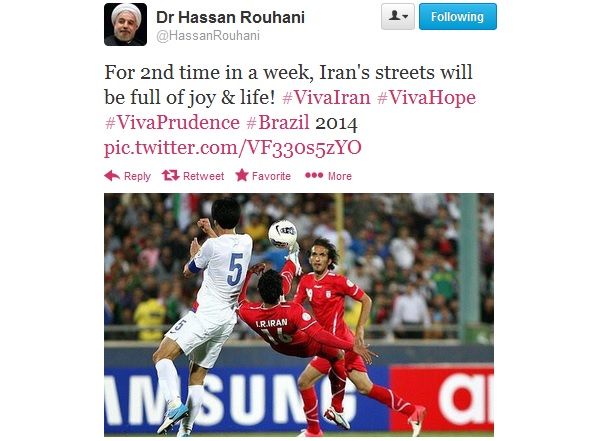Garrett Nada
Hassan Rouhani is big into Twitter. (Or at least someone in his office is.) Since his election, Iran’s new president has tweeted prolifically —in both English and Farsi – on everything from World Cup soccer to women’s rights, from nuclear negotiations to Internet censorship.
His English language account is @HassanRouhani. It now offers one of the most telling (not to mention concise) windows into his thinking—and how the Scottish-educated cleric wants the world to perceive him. Although Twitter is periodically banned in Iran, Rouhani also has a feed in Farsi @rouhani92 for an Iranian audience, according to an administrator who responded to inquiries through the president’s official Facebook page.
Rouhani’s two Twitter accounts have even been used to declare his policies. Some tweets offer tantalizing hints at change.
On the nuclear controversy, Rouhani’s English feed tweeted that Iran could take “more steps” to show compliance with an international treaty.
On foreign policy, it tweeted about a new openness to direct U.S.-Iran talks.
On basic freedoms, his tweets criticized censorship and supported women’s rights.
 Iranians seem to have a “don’t ask, don’t tell” relationship with Twitter and Facebook. Both have been periodically blocked, especially around elections. But millions of Iranians use software to get around government blocks on websites and social media. And many Iranian leaders and organizations have accounts that appear official. Seven of the eight presidential candidates opened Twitter accounts for the 2013 campaign. Even Supreme Leader Ayatollah Ali Khamenei has official Twitter and Facebook accounts.
Iranians seem to have a “don’t ask, don’t tell” relationship with Twitter and Facebook. Both have been periodically blocked, especially around elections. But millions of Iranians use software to get around government blocks on websites and social media. And many Iranian leaders and organizations have accounts that appear official. Seven of the eight presidential candidates opened Twitter accounts for the 2013 campaign. Even Supreme Leader Ayatollah Ali Khamenei has official Twitter and Facebook accounts.Rouhani’s English-language account was launched on May 5. It had more than 13,000 followers by late July and produced up to 50 tweets per day. But @HassanRouhani only followed four on Twitter — Supreme Leader Ali Khamenei, former President Mohammed Khatami, former President Akbar Hashemi Rafsanjani and former presidential candidate Mohammad Reza Aref.
The scope of the president-elect’s personal involvement in his Twitter accounts is unclear. But he is fluent in English. Rouhani received master’s and doctoral degrees from Glasgow Caledonian University in the 1990s. @HassanRouhani even tweeted a link to a video of him receiving his doctorate. And the pace of Rouhani’s tweets has increased since the election, as has the range of topics tweeted.
The English account is savvy in its use of Twitter shorthand and hashtags. In a country where Western media is hard to find, the account has retweeted articles from The Wall Street Journal, CNN and other American media—notably pieces that portrayed his election as a fresh start for Iran and the outside world.A third account— @HassanRouhani_, which tweets in Arabic, English, French and Spanish—is not associated with the president-elect, the Facebook administrator claimed. The following is a rundown of tweets by @HassanRouhani on key issues.
On the United States
Rouhani’s English feed has tweeted frequently about the United States—and indicated potential openings. “131 Congressmen have signed a letter calling on President #Obama to give peace a chance with Iran’s new President,” it tweeted on July 20.
One of the most intriguing tweets – just two days after Rouhani was elected—was a decade-old picture of him at a U.S. field hospital that treated earthquake survivors in historic Bam. Rouhani is shown next to a female American medic in the 2003 photo. The tweet even featured the #US hashtag.

Rouhani has said that the time has come to “rectify things” with the United States. His Twitter account posted live translations of these remarks from his June 17 press conference, one day after election results were announced.

On the Economy
@HassanRouhani’s tweets have been especially candid on Iran’s troubled economy, which has shrunk during the past two years for the first time since the 1980-1988 war with Iraq. Rouhani’s account tweeted his pledge to parliamentarians not to fool them with inaccurate statistics.

Rouhani has claimed that job growth under Ahmadinejad’s administration was exaggerated. Only 14,000 jobs were created each year since 2005 on average, his Twitter account noted. “Our youth go to uni, get their BA, MA & PhD – and then straight to #unemployment,” it tweeted. Boosting foreign tourism would help, it said.

On Women
Rouhani’s tweets have been almost progressive on women. He campaigned to reverse female unemployment.

The new president’s tweets have supported increased women’s participation in society, including in sports. Some tweets congratulated the women’s futsal team on winning the silver medal at the July 2013 Asian Indoor and Martial Arts Games. (Futsal is a form of indoor soccer.)

Rouhani’s tweets have promised a new ministry of women’s affairs and financial support for female heads of households.

On Personal Freedoms and Censorship
Rouhani’s tweets have taken bold stances on sensitive issues. His tweets warned that Internet filtering creates distrust between people and the government.

Two of Rouhani’s tweets admitted that many Iranians prefer foreign channels to the official Islamic Republic of Iran Broadcasting (IRIB).
 His tweets have also challenged censorship and encouraged personal freedoms.
His tweets have also challenged censorship and encouraged personal freedoms. 
On Nukes
The new president’s tweets have advocated building trust with the outside world on Iran’s controversial nuclear program. A promise at his first press conference (in Farsi) that Iran would provide more information was instantly tweeted (in English).The nuclear issue is one of Rouhani’s specialties. He was chief nuclear negotiator and national security adviser for 16 years between 1989 and 2005.
 Rouhani’s tweets have denied that Tehran wants nuclear weapons. “Iran was not, is not, and will never be after #nuclear bomb,” his account tweeted. “We only seek peaceful #technology.” Another tweet linked to a letter he wrote to TIME magazine in 2006 expressing opposition to nuclear weapons.
Rouhani’s tweets have denied that Tehran wants nuclear weapons. “Iran was not, is not, and will never be after #nuclear bomb,” his account tweeted. “We only seek peaceful #technology.” Another tweet linked to a letter he wrote to TIME magazine in 2006 expressing opposition to nuclear weapons.On Sports
Rouhani’s tweets have even been playful. @HassanRouhani posted a dozen messages of congratulations or encouragement to Iranian teams, including several after the June 18 win over South Korea that qualified the men’s soccer team for the 2014 World Cup. The game was “an introduction to bigger #victories and #powerful presence our nation in all fields,” Rouhani’s account tweeted. Youth had already taken to the streets to celebrate his June 15 electoral victory earlier that week.
Garrett Nada is a Program Assistant in the Center for Conflict Management at the United States Institute of Peace.
Online news media are welcome to republish original blog postings from this website in full, with a citation and link back to The Iran Primer website (www.iranprimer.com) as the original source. Any edits must be authorized by the author. Permission to reprint excerpts from The Iran Primer book should be directed to permissions@usip.org

